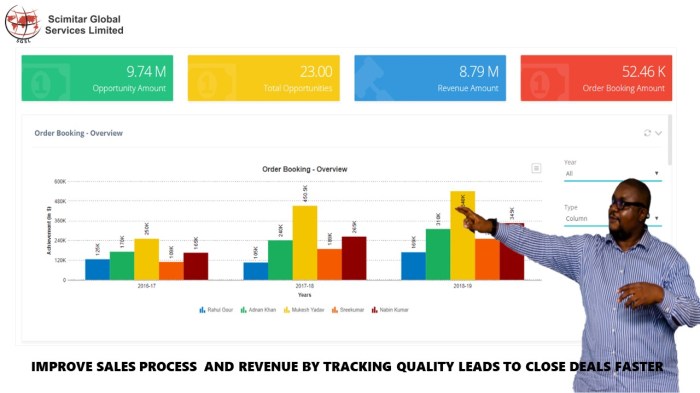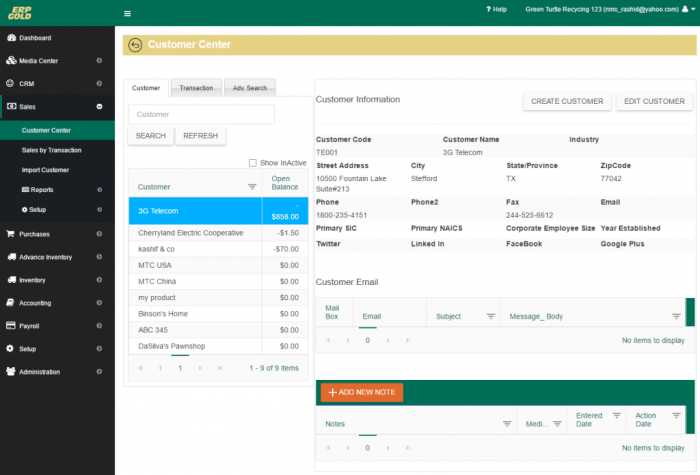Crm with accounting software – In today’s dynamic business landscape, efficient management of customer relationships and financial records is paramount. Integrating Customer Relationship Management (CRM) software with accounting software offers a powerful synergy, streamlining operations and boosting profitability. This comprehensive guide delves into the benefits, functionalities, and considerations of integrating these crucial business tools. We’ll explore how this integration can enhance your business’s efficiency, accuracy, and overall success.
Understanding the Synergy: CRM and Accounting Software Integration
Traditionally, CRM and accounting systems operated as separate entities. However, modern businesses are recognizing the significant advantages of connecting these systems. This integration allows for a seamless flow of data between customer interactions and financial transactions, providing a holistic view of your business performance and customer lifecycle.
Key Benefits of Integration:, Crm with accounting software
- Improved Data Accuracy: Manual data entry is prone to errors. Integration eliminates this risk by automatically transferring data between systems, ensuring consistency and accuracy across all records.
- Enhanced Efficiency: Streamlined workflows reduce the time spent on administrative tasks, allowing your team to focus on strategic initiatives and customer engagement.
- Better Financial Reporting: Gain deeper insights into your business’s financial health by linking customer interactions to revenue generation. Analyze customer profitability and identify areas for improvement.
- Improved Customer Relationship Management: Access comprehensive customer profiles, including their purchase history, payment details, and communication logs, enabling personalized interactions and targeted marketing campaigns.
- Streamlined Invoicing and Payment Processing: Automate invoice generation and payment tracking, reducing delays and improving cash flow.
- Reduced Operational Costs: By automating tasks and minimizing manual data entry, integration reduces labor costs and minimizes the risk of human error.
- Better Sales Forecasting: Analyze sales trends and customer behavior to create more accurate sales forecasts and improve inventory management.
Key Features to Look for in Integrated CRM and Accounting Software: Crm With Accounting Software
When choosing integrated CRM and accounting software, consider the following features:
Essential Features:
- Real-time Data Synchronization: Ensure data is updated instantly across both systems, providing an accurate and up-to-date view of your business.
- Automated Data Transfer: Automate the transfer of customer data, invoices, payments, and other relevant information to eliminate manual data entry.
- Customizable Reporting and Dashboards: Access customizable reports and dashboards to monitor key performance indicators (KPIs) and gain valuable insights into your business performance.
- Seamless User Interface: Choose software with a user-friendly interface that integrates seamlessly with your existing workflows.
- Robust Security Features: Ensure the software protects sensitive customer and financial data with robust security measures.
- Scalability: Choose software that can scale with your business’s growth, accommodating increasing data volumes and user needs.
- Integration with other Business Applications: Consider software that integrates with other essential applications, such as email marketing platforms and e-commerce solutions.
Choosing the Right CRM and Accounting Software Combination
Selecting the appropriate software depends on your specific business needs and size. Consider factors like the number of users, the complexity of your financial reporting requirements, and the level of customization required.
Factors to Consider:
- Business Size and Complexity: Small businesses may find all-in-one solutions sufficient, while larger enterprises may require more specialized and customizable systems.
- Industry-Specific Requirements: Some industries have specific accounting and CRM requirements. Choose software that caters to your industry’s unique needs.
- Budget: Software costs vary significantly. Consider your budget and choose a solution that offers the best value for your investment.
- Integration Capabilities: Ensure the software integrates seamlessly with your existing systems and future technology plans.
- Customer Support: Choose a provider with excellent customer support to assist with implementation, training, and ongoing maintenance.
Examples of Integrated CRM and Accounting Software Solutions
Many software providers offer integrated CRM and accounting solutions or robust integrations between their separate platforms. Researching options like Xero, QuickBooks, Zoho CRM, Salesforce, and others is crucial to find the best fit for your business. Each offers varying levels of integration and features.
Frequently Asked Questions (FAQ)
- Q: What are the benefits of integrating CRM and accounting software?
A: Integration offers improved data accuracy, enhanced efficiency, better financial reporting, improved customer relationship management, streamlined invoicing, reduced operational costs, and better sales forecasting.
- Q: How much does integrated CRM and accounting software cost?
A: Costs vary significantly depending on the features, number of users, and provider. Pricing models range from subscription-based to one-time purchases.
- Q: Is it difficult to implement integrated CRM and accounting software?
A: Implementation complexity depends on the chosen software and your business’s existing systems. Many providers offer implementation support and training.
- Q: What security measures should I consider?
A: Ensure the software provider employs robust security measures, including data encryption, access controls, and regular security updates.
- Q: Can I integrate my existing CRM and accounting software?
A: Many CRM and accounting systems offer APIs or integrations that allow for data exchange. However, the feasibility depends on the specific software used.
Conclusion
Integrating CRM and accounting software offers significant advantages for businesses of all sizes. By streamlining workflows, improving data accuracy, and providing deeper insights into customer behavior and financial performance, this integration empowers businesses to make data-driven decisions and achieve sustainable growth. Careful consideration of your specific needs and a thorough evaluation of available solutions are crucial for selecting the right system to optimize your business operations.
References
While specific product links are avoided to maintain neutrality, research reputable software review sites and the websites of major CRM and accounting software providers (e.g., Salesforce, Xero, QuickBooks, Zoho) for detailed information on their products and integration capabilities.
Call to Action
Ready to transform your business operations with the power of integrated CRM and accounting software? Contact us today for a free consultation to discuss your specific needs and find the perfect solution for your business.
FAQ Insights
What are the benefits of integrating CRM and accounting software?
Improved data accuracy, streamlined workflows, better financial insights, increased efficiency, enhanced customer relationship management, and better decision-making capabilities.
What types of businesses would benefit most from this integration?
Businesses of all sizes can benefit, but those with complex sales processes, multiple revenue streams, or a high volume of transactions will see the most significant improvements.
What are some common challenges in integrating CRM and accounting software?

Source: scimitargsl.com
Data migration issues, system compatibility problems, and the need for adequate training for staff are common challenges.
How much does CRM with accounting software integration typically cost?
Costs vary greatly depending on the specific software chosen, the size of the business, and the complexity of the integration process. It’s best to get quotes from multiple vendors.

Source: erp.gold
Is it difficult to learn how to use integrated CRM and accounting software?
The learning curve varies depending on the software and prior experience. Most systems offer user-friendly interfaces and comprehensive training resources.
